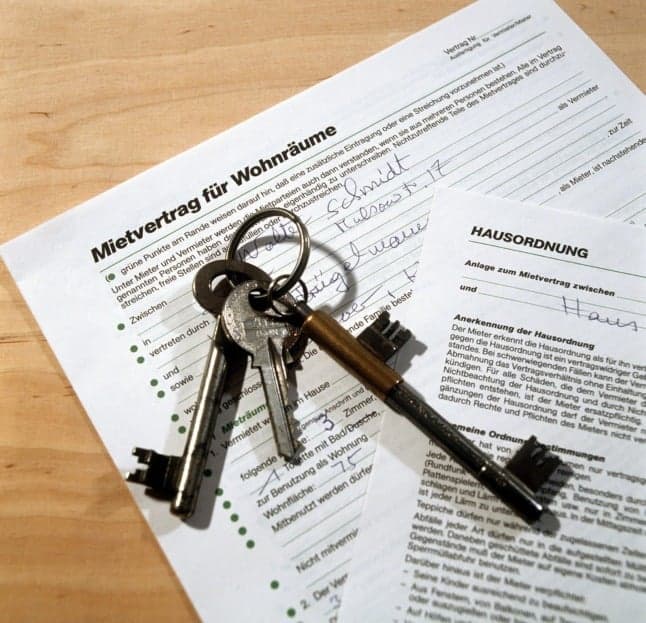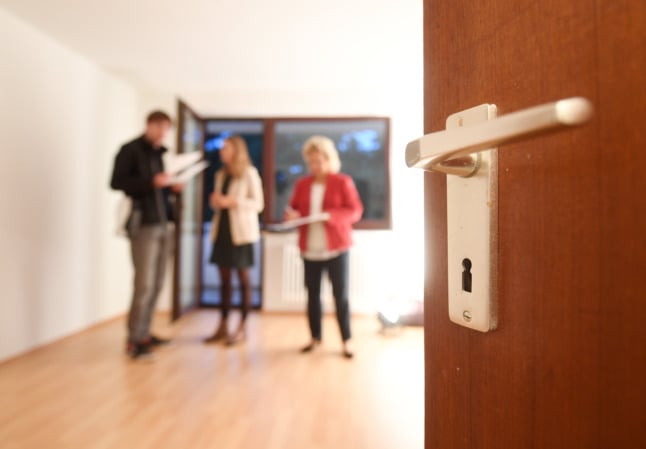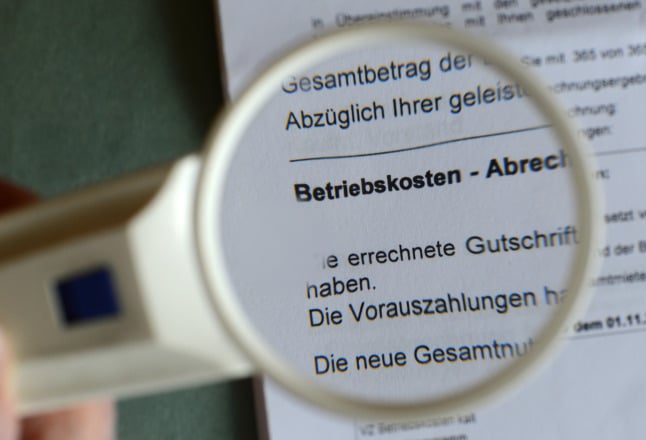EXPLAINED: The hidden costs of renting in Germany

From kitchens to skirting boards and even front door name signs - renting a flat in Germany can involve a lot of hidden costs.
Looking to move? Find your next rental apartment here.
Signing a rental contract is a dream come true for many foreigners in Germany given the tense housing situation in cities.
But many people might not be aware of the extra costs that come with renting. Here's a look at what you can expect.
How exactly does rent work in Germany?
The first thing to be aware of is that in Germany you'll see a 'cold' and 'warm' rent on your contract. Kaltmiete is the rent for the property itself, and the Warmmiete is the cold rent plus the Nebenkosten - the associated or ancillary costs.
Looking for a new rental? Find your next rental apartment here
These costs can include things like property tax, hot water, cleaning and electricity in common areas, garden maintenance, parking, lifts and stairwell maintenance, cable TV/connection costs, water, sewage and caretaker fees.
On some flats, the Nebenkosten includes heating costs, however some tenants have to pay their heating fees separately with a utilities company. This will be specified in your contract.
The side costs do not usually include things like broadband, electricity and TV tax so you'll have to factor these things into your budget. Sometimes the cable connection will be listed as a separate cost aside from the Nebenkosten.
READ ALSO: Six confusing things about renting a flat in Germany

A real estate agent shows people round a flat in Munich. Photo: picture alliance/dpa | Tobias Hase
A notable exception of this is if you are subletting from a Hauptmieter (main tenant) or it's a student flat - in this case all extra costs are usually bundled in with the final rent amount that you pay monthly.
Forking out for a kitchen
One surprise that foreigners often get when renting in Germany is that the kitchen might not be included in the apartment. That means you'll have to buy a new kitchen when you move in or you can arrange to purchase it from the tenant moving out.
If the kitchen is included, the letters EBK (standing for Einbauküche) are usually in the ad for the flat. Sometimes a flat will be advertised as having a stove and sink - and that is literally all that will be in the kitchen room. It means you'll have to shell out for some countertops and cupboards or shelves which can end up costing hundreds or even thousands of euros.
Germany is known for having strong tenants' rights making it very difficult for landlords to turf people out of their homes. Plus traditionally low rents mean people tend to stay in apartments for a long time, meaning investing in a kitchen might not be a bad idea.
However, because rents have been rising so rapidly in Germany, and landlords are deemed to have the upper hand at the moment after the constitutional court threw out Berlin's rent freeze law in 2021, this tradition can now be a burden on tenants, especially those entering into new higher rate contracts.
Structural changes
Tenants might also have to take on the costs of some other structural changes made by the previous tenant, such as flooring, which can again cost hundreds or thousands of euros. Skirting boards could also be added on to your bill. Agreements on taking over costs are signed by the previous tenant (Vormieter) and the new tenant (Nachmieter) and placed on file.
Light fittings
When you enter your new German apartment you will probably see a bunch of electrical wires on the roof. That's where you are meant to install light fittings. If you are unsure how to do this then call an electrician before fiddling with wires yourself.
Appliances
Furthermore, appliances are usually not included in new flats in Germany so you'll have to pay for things like washing machines, fridges and freezers.
Deposit
Another cost that you have to budget for is the Kaution or deposit. This usually amounts to two or three months of the 'cold rent'. So if your Kaltmiete is €500 then your deposit will be up to €1,500. The landlord or property caretaker cannot ask for more than three months rent on a residential property.
This payment is meant to act as the landlord’s insurance against lost rent or damage to the property. It is a deposit so you should get it back unless the landlord claims you've damaged the flat after you move out.
You can also pay this in three instalments. Some landlords or housing providers will put pressure on you to transfer the whole deposit over in one. You can do this if you want to do but it is the tenant's right to pay in three monthly instalments.
READ ALSO: How much deposit do I have to pay when renting in Germany
What else might I have to pay?
Some landlords or property management firms will charge you a fee for your name to be added to the doorbell of your apartment (the Namenschilder). Yes, even if it's a case of sliding a piece of paper with your name on it onto your flat buzzer.
This can cost anywhere between €10 and €50 (or even more if they are chancers).

Photo: picture alliance / dpa | Jens Kalaene
However, the law around this is dubious. According to a case reported on by Welt newspaper in 2012, landlords or property management firms cannot pass on all costs to their tenants.
For example, expenses for new nameplates (or pipe cleaning in this case) are not automatically operating costs, the Augsburg District Court ruled. Only current expenses are considered operating costs.
In that case, the landlord had listed expenses for new nameplates and the removal of a pipe blockage in the operating costs statement. The tenants refused to reimburse the amount, and the flat owner sued.
The judges ruled that the costs for the nameplates were not operating costs. The replacement of the signs was linked to the new tenancy and therefore not part of the running costs. The pipe cleaning was not part of the operating because it was a repair and the landlord had to pay for this.
READ ALSO: Germany's ruthless housing market is tough on new tenants - but there are winners
Is there any way around these costs?
Not really. When it comes to furnishing your flat, you could try and buy items like appliances - or the whole kitchen - from the previous tenant and get a slight discount. You can also pick up second hand items from places like Ebay Kleinanzeigen.
Another option is to pick a furnished apartment. These are usually advertised in new build flats which means the rent will probably be higher than in an Altbau (old-style building).
Do I get to see what the operating costs are for?
Yes, you should. You pay the costs in fixed monthly amounts and under German law the landlord or housing firm is obliged to settle the service charges annually.
The statement of operating costs (Betriebskostenabrechnung) must show things like details of the total costs, how costs are distributed among tenants and calculation of the tenant's share.
What can I do if I'm worried about being charged too much?
Since you want to try and stay on good terms with your landlord or property management, you could ask them for clarification on costs before making any demands.
Alternatively you can seek some advice from a tenants' association (Mieterverein) who can provide you with advice and let you know if something isn't right and should be challenged. There are some costs involved with joining a tenants' association, though so bear that in mind.
Comments
See Also
Signing a rental contract is a dream come true for many foreigners in Germany given the tense housing situation in cities.
But many people might not be aware of the extra costs that come with renting. Here's a look at what you can expect.
How exactly does rent work in Germany?
The first thing to be aware of is that in Germany you'll see a 'cold' and 'warm' rent on your contract. Kaltmiete is the rent for the property itself, and the Warmmiete is the cold rent plus the Nebenkosten - the associated or ancillary costs.
Looking for a new rental? Find your next rental apartment here
These costs can include things like property tax, hot water, cleaning and electricity in common areas, garden maintenance, parking, lifts and stairwell maintenance, cable TV/connection costs, water, sewage and caretaker fees.
On some flats, the Nebenkosten includes heating costs, however some tenants have to pay their heating fees separately with a utilities company. This will be specified in your contract.
The side costs do not usually include things like broadband, electricity and TV tax so you'll have to factor these things into your budget. Sometimes the cable connection will be listed as a separate cost aside from the Nebenkosten.
READ ALSO: Six confusing things about renting a flat in Germany

A notable exception of this is if you are subletting from a Hauptmieter (main tenant) or it's a student flat - in this case all extra costs are usually bundled in with the final rent amount that you pay monthly.
Forking out for a kitchen
One surprise that foreigners often get when renting in Germany is that the kitchen might not be included in the apartment. That means you'll have to buy a new kitchen when you move in or you can arrange to purchase it from the tenant moving out.
If the kitchen is included, the letters EBK (standing for Einbauküche) are usually in the ad for the flat. Sometimes a flat will be advertised as having a stove and sink - and that is literally all that will be in the kitchen room. It means you'll have to shell out for some countertops and cupboards or shelves which can end up costing hundreds or even thousands of euros.
Germany is known for having strong tenants' rights making it very difficult for landlords to turf people out of their homes. Plus traditionally low rents mean people tend to stay in apartments for a long time, meaning investing in a kitchen might not be a bad idea.
However, because rents have been rising so rapidly in Germany, and landlords are deemed to have the upper hand at the moment after the constitutional court threw out Berlin's rent freeze law in 2021, this tradition can now be a burden on tenants, especially those entering into new higher rate contracts.
Structural changes
Tenants might also have to take on the costs of some other structural changes made by the previous tenant, such as flooring, which can again cost hundreds or thousands of euros. Skirting boards could also be added on to your bill. Agreements on taking over costs are signed by the previous tenant (Vormieter) and the new tenant (Nachmieter) and placed on file.
Light fittings
When you enter your new German apartment you will probably see a bunch of electrical wires on the roof. That's where you are meant to install light fittings. If you are unsure how to do this then call an electrician before fiddling with wires yourself.
Appliances
Furthermore, appliances are usually not included in new flats in Germany so you'll have to pay for things like washing machines, fridges and freezers.
Deposit
Another cost that you have to budget for is the Kaution or deposit. This usually amounts to two or three months of the 'cold rent'. So if your Kaltmiete is €500 then your deposit will be up to €1,500. The landlord or property caretaker cannot ask for more than three months rent on a residential property.
This payment is meant to act as the landlord’s insurance against lost rent or damage to the property. It is a deposit so you should get it back unless the landlord claims you've damaged the flat after you move out.
You can also pay this in three instalments. Some landlords or housing providers will put pressure on you to transfer the whole deposit over in one. You can do this if you want to do but it is the tenant's right to pay in three monthly instalments.
READ ALSO: How much deposit do I have to pay when renting in Germany
What else might I have to pay?
Some landlords or property management firms will charge you a fee for your name to be added to the doorbell of your apartment (the Namenschilder). Yes, even if it's a case of sliding a piece of paper with your name on it onto your flat buzzer.
This can cost anywhere between €10 and €50 (or even more if they are chancers).

However, the law around this is dubious. According to a case reported on by Welt newspaper in 2012, landlords or property management firms cannot pass on all costs to their tenants.
For example, expenses for new nameplates (or pipe cleaning in this case) are not automatically operating costs, the Augsburg District Court ruled. Only current expenses are considered operating costs.
In that case, the landlord had listed expenses for new nameplates and the removal of a pipe blockage in the operating costs statement. The tenants refused to reimburse the amount, and the flat owner sued.
The judges ruled that the costs for the nameplates were not operating costs. The replacement of the signs was linked to the new tenancy and therefore not part of the running costs. The pipe cleaning was not part of the operating because it was a repair and the landlord had to pay for this.
READ ALSO: Germany's ruthless housing market is tough on new tenants - but there are winners
Is there any way around these costs?
Not really. When it comes to furnishing your flat, you could try and buy items like appliances - or the whole kitchen - from the previous tenant and get a slight discount. You can also pick up second hand items from places like Ebay Kleinanzeigen.
Another option is to pick a furnished apartment. These are usually advertised in new build flats which means the rent will probably be higher than in an Altbau (old-style building).
Do I get to see what the operating costs are for?
Yes, you should. You pay the costs in fixed monthly amounts and under German law the landlord or housing firm is obliged to settle the service charges annually.
The statement of operating costs (Betriebskostenabrechnung) must show things like details of the total costs, how costs are distributed among tenants and calculation of the tenant's share.
What can I do if I'm worried about being charged too much?
Since you want to try and stay on good terms with your landlord or property management, you could ask them for clarification on costs before making any demands.
Alternatively you can seek some advice from a tenants' association (Mieterverein) who can provide you with advice and let you know if something isn't right and should be challenged. There are some costs involved with joining a tenants' association, though so bear that in mind.
Join the conversation in our comments section below. Share your own views and experience and if you have a question or suggestion for our journalists then email us at [email protected].
Please keep comments civil, constructive and on topic – and make sure to read our terms of use before getting involved.
Please log in here to leave a comment.